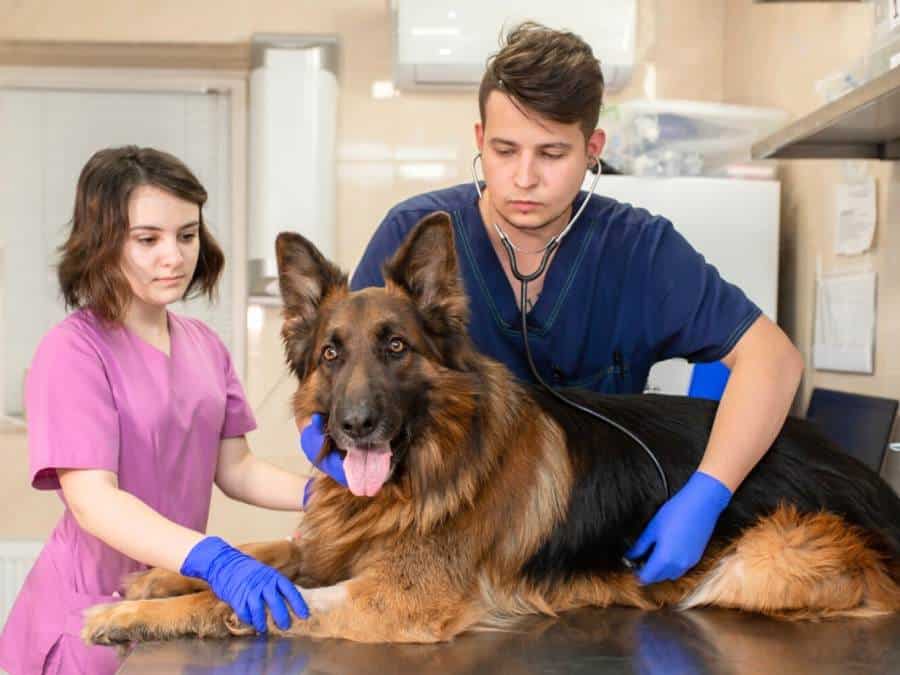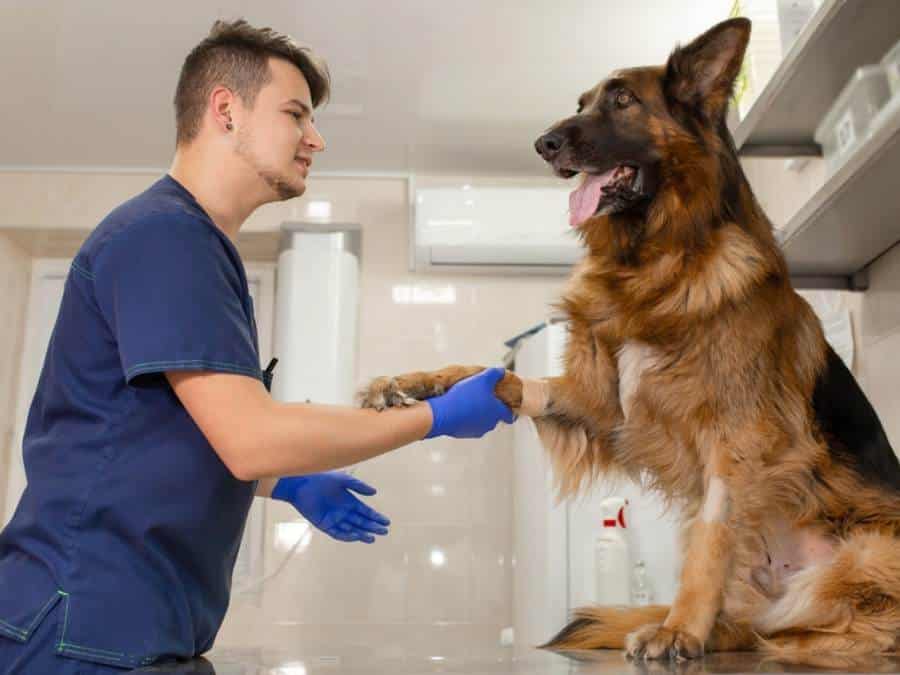Did you know that German Shepherds, despite their reputation for strength and vitality, have a shorter lifespan compared to some other breeds? Understanding “What Do German Shepherds Usually Die From?” is crucial for responsible GSD parents like us who want to provide the best care.
From mobility issues, and renal failure to cardiac diseases, various health problems can impact these beloved dogs as they age.
Leading Causes Of Deaths in German Shepherds
German Shepherds have a higher risk of certain health problems because of their breed-specific genetics. Some of the leading causes of death for them include hip dysplasia, degenerative myelopathy, and various types of cancer, particularly hemangiosarcoma and osteosarcoma.
According to this research done in Sweden, which looked at the insurance data for morbidity and mortality rates of 445,336 dogs, it was found that the leading cause of death among German Shepherds was locomotor disorders.
Locomotor disorders in GSDs refers to certain musculoskeletal and neurological conditions such as hip & elbow dysplasia, degenerative myelopathy, degenerative nerve diseases, etc.
In the same study, it was also found that German Shepherds are predisposed to immune-related disorders, such as allergies, perianal fistulae, and exocrine pancreatic atrophy, with significantly increased risk compared with all other breeds.
Average Lifespan of German Shepherds
Although AKC suggests that German Shepherds tend to live 7 – 10 years, but typically the average lifespan of a German Shepherd ranges from 9 to 13 years. However, it’s important to note that individual dogs may live shorter or longer lives depending on various factors.

Factors Influencing German Shepherd’s Lifespan
The lifespan of a German Shepherd, like any other dog breed, can be influenced by various factors.
- Genetics: Responsible breeding practices, including screening for genetic disorders, can contribute to a longer and healthier life.
- Nutrition: A balanced and nutritious diet, appropriate portion sizes, and avoidance of harmful human foods can impact a dog’s health and longevity.
- Exercise: Regular exercise can help maintain a healthy weight, prevent obesity-related issues, and promote overall well-being.
- Healthcare: Regular veterinary check-ups, vaccinations, and preventive care can contribute to a longer and healthier life.
- Environment: A clean and safe living space, protection from extreme weather conditions, and proper shelter contribute to the well-being of a German Shepherd.
- Spaying/Neutering: Responsible spaying or neutering may contribute to the overall health of a German Shepherd.
- Socialization and Training: A well-adjusted and trained German Shepherd is likely to experience less stress and anxiety, promoting overall health.
If you want to learn more about factors affecting German Shepherd life expectancy and how you can increase your GSD’s lifespan, you must read my article “How Long Do German Shepherds Live?”
RELATED: Female German Shepherd Life Expectancy
Common Health Issues That German Shepherds Usually Die From
Like any other breed, German Shepherds are prone to certain health issues that can significantly impact their lifespan. It is important for owners to be aware of these common health problems to ensure the well-being and longevity of their beloved pets.
Here are some of the most prevalent health issues that German Shepherds usually die from:
- Hip and Elbow Dysplasia
- Degenerative Myelopathy
- Bloat
- Cancer
- Exocrine Pancreatic Insufficiency (EPI)
- Perianal Fistula
- Cardiac Diseases
- Allergies
- Seizures (Canine Epilepsy)
- Chronic Renal Failure
1. Hip & Elbow Dysplasia
Hip dysplasia is a common health issue in German Shepherds. It is a condition where the hip joint does not develop properly, leading to instability and potential pain and discomfort for the dog.

Similar to hip dysplasia, elbow dysplasia is a malformation of the elbow joint, leading to arthritis and lameness.
German Shepherds are particularly prone to these conditions due to their genetics and size.
Hip dysplasia can be caused by a combination of genetic factors and environmental factors such as rapid growth, improper nutrition, and excessive exercise at a young age.
RELATED: German Shepherd Growth & Weight Chart
Symptoms of hip & elbow dysplasia in German Shepherds can include difficulty in getting up, limping or favoring one leg, stiffness, and decreased activity levels.
Treatment options can range from conservative management, including weight management, exercise modification, and pain medication, to surgical interventions such as total hip replacement or femoral head ostectomy.
How hip & elbow dysplasia can lead to a German Shepherd’s death?
Severe cases of hip & elbow dysplasia can lead to chronic pain, inflammation, limited mobility, and the development of arthritis, making it difficult for them to move or perform basic activities. This can result in a decreased quality of life for the affected dog.
Over time, the pain and physical limitations associated with hip dysplasia may contribute to secondary issues such as obesity, cardiovascular strain, and muscle atrophy.
In some extreme cases, where the dog’s suffering becomes unbearable, owners may face the difficult decision of humane euthanasia to prevent further distress and ensure the dog does not endure unnecessary pain.
RELATED:
- Signs & Treatment of Hip Dysplasia in German Shepherds
- Signs & Treatment of German Shepherd Elbow Dysplasia
2. Degenerative Myelopathy (DM)
Degenerative Myelopathy or DM is a progressive neurological disease that affects German Shepherds and can ultimately lead to their death.

According to this study, this condition primarily affects the spinal cord, causing a gradual degeneration of the nerves responsible for controlling the hind limbs.
As the disease advances, the hind limb weakness worsens, making it increasingly difficult for the dog to walk or even stand.
They may drag their hind legs or knuckle over, leading to injuries such as sores and infections. Over time, the muscles in the hind limbs may also begin to atrophy due to lack of use.
RELATED: How To Make German Shepherd Back Legs Stronger?
The exact cause of DM is still unknown, but it is believed to have a genetic component.
Unfortunately, there is currently no cure for DM, and treatment options are limited. This may include physical therapy, assistive devices such as wheelchairs or harnesses, and medications to alleviate pain and inflammation.
Eventually, as the disease progresses, the dog’s quality of life may deteriorate to a point where euthanasia becomes the most humane option.
RELATED: Degenerative Myelopathy in German Shepherds
3. Bloat
Bloat, also known as Gastric Dilatation-Volvulus (GDV), is a serious and potentially life-threatening condition that can affect German Shepherds.
It occurs when the stomach fills with gas and becomes twisted, leading to a variety of complications.

Bloat can be caused by several factors, including eating too quickly, exercising vigorously after a meal, or having a deep-chested conformation.
In German Shepherds, bloat can be particularly dangerous due to their deep chests. The breed’s deep-chested conformation makes them more prone to developing GDV. When the stomach twists, it can cut off blood flow to the stomach and other vital organs, leading to tissue death and organ failure.
The symptoms of bloat in German Shepherds can vary but typically include restlessness, pacing, drooling, unsuccessful attempts to vomit, and a distended abdomen.
If left untreated, bloat can rapidly progress and cause shock, difficulty breathing, and collapse. In severe cases, it can lead to death within a matter of hours.
Prompt medical intervention is essential to relieve the gas buildup, untwist the stomach, and restore blood flow to the affected organs.
Some measures that can help reduce the risk include feeding multiple smaller meals throughout the day instead of one large meal, using slow-feed bowls or puzzle toys to slow down eating, avoiding vigorous exercise immediately before or after meals, and monitoring the dog’s water intake.
4. Cancer
Older German Shepherds are prone to several types of cancer that can have devastating consequences.
One common type is hemangiosarcoma, which affects the blood vessels and organs such as the spleen, liver, and heart. This aggressive cancer often goes undetected until it reaches an advanced stage, making treatment difficult.
RELATED: German Shepherd Cancer Symptoms

The aggressive nature of hemangiosarcoma often results in sudden internal bleeding or organ failure, leading to a rapid decline in the dog’s health.
Another type of cancer is osteosarcoma, which affects the bones. This cancer typically develops in the limbs and can lead to pain, lameness, and fractures.
RELATED: Hemangiosarcoma in German Shepherds
Osteosarcoma can cause severe pain and mobility issues, and if the cancer spreads to other parts of the body, it can become untreatable
Additionally, German Shepherds are also at risk for lymphoma, a cancer that affects the lymphatic system. Symptoms may include swollen lymph nodes, lethargy, and weight loss.
Lymphoma, if left untreated or unresponsive to treatment, can weaken the immune system and lead to complications such as infections or organ failure.
When left untreated or if treatment is unsuccessful, these types of cancer can ultimately lead to death in German Shepherds.
Early detection and intervention can greatly increase the chances of successful treatment and improve the overall prognosis for these beloved dogs.
5. Exocrine Pancreatic Insufficiency (EPI)
Exocrine Pancreatic Insufficiency (EPI) is a condition that affects the digestive system of German Shepherds and can ultimately lead to their death if left untreated.

According to VCA Hospitals, EPI occurs when the pancreas fails to produce enough digestive enzymes, such as amylase, lipase, and protease, which are essential for breaking down food and absorbing nutrients.
In German Shepherds, EPI is often caused by a genetic predisposition, although it can also be triggered by other factors such as pancreatitis or pancreatic trauma. The lack of digestive enzymes leads to malabsorption of nutrients, resulting in weight loss, poor coat condition, and frequent diarrhea.
If left untreated, EPI can lead to malnutrition and weakened immune function, making them more susceptible to infections and other health issues.
In advanced stages of EPI, German Shepherds may develop secondary complications such as diabetes mellitus or exocrine pancreatic adenocarcinoma. These conditions can further worsen their overall health and may ultimately result in their death.
Fortunately, with proper diagnosis and treatment, German Shepherds with EPI can lead relatively normal lives.
Treatment typically involves enzyme replacement therapy, where synthetic digestive enzymes are administered with each meal to aid in the digestion and absorption of nutrients.
6. Perianal Fistula
Perianal Fistula in German Shepherds is a condition that affects the anal region of these dogs. It is characterized by the formation of abnormal tunnels or tracts around the anus, which can lead to various complications if left untreated.

The condition is more common in middle-aged to older dogs, and intact males are more frequently affected than females.
If left untreated, perianal fistulas can cause severe pain and discomfort for the affected dog.
The fistulas can become infected, leading to the formation of abscesses and the spread of bacteria. This can result in systemic infections, such as sepsis, which can be life-threatening.
In addition to the physical pain and discomfort, perianal fistulas can also lead to significant weight loss and a decline in overall health. Dogs with severe cases may experience difficulty in defecating and may even develop fecal incontinence.
Treatment options may include medical management with antibiotics, anti-inflammatory drugs, and topical ointments. In more severe cases, surgical intervention may be necessary to remove the affected tissue and promote healing.
7. Cardiac Diseases
One common heart disease in German Shepherds is dilated cardiomyopathy (DCM). In this condition, the heart muscle becomes weak and enlarged, making it difficult for the heart to pump blood effectively.

As a result, the dog may experience symptoms such as fatigue, difficulty breathing, coughing, and fluid retention. If left untreated, DCM can lead to congestive heart failure and ultimately result in the death of the German Shepherd.
Another heart disease that can affect German Shepherds is valvular heart disease. This condition occurs when the valves in the heart become damaged or weakened, leading to improper blood flow.
Over time, this can cause the heart to become enlarged and weakened, leading to symptoms such as coughing, exercise intolerance, and fainting.
If not managed properly, valvular heart disease can also lead to congestive heart failure and potentially result in the death of the German Shepherd.
RELATED: Why Do German Shepherds Pant So Much?
8. Allergies

German Shepherds, like any other breed, can develop allergies to various substances such as pollen, dust mites, certain foods, or even certain medications.
These allergies can manifest in a variety of ways, including skin rashes, itching, excessive scratching, ear infections, digestive issues, and respiratory problems.
When a German Shepherd is allergic to a specific substance, their immune system overreacts to it, triggering an allergic reaction.
This immune response can cause inflammation and damage to different organs and systems in the body. If the allergic reaction is severe and not promptly addressed, it can lead to life-threatening complications.
One potential consequence of severe allergies in German Shepherds is anaphylaxis. Anaphylaxis is a severe and rapid allergic reaction that can result in difficulty breathing, swelling of the face and throat, a drop in blood pressure, and even collapse.
Another potential consequence of allergies in German Shepherds is the development of secondary infections. Constant scratching and irritation caused by allergies can weaken the skin’s natural barrier, making it more susceptible to bacterial or fungal infections.
These secondary infections can spread and worsen if not properly treated, potentially leading to systemic infections that can be life-threatening.
RELATED:
9. Seizures
German Shepherds are prone to a condition called canine epilepsy, which is characterized by recurring seizures.

These seizures can range in severity and duration, and they can be caused by various factors such as genetics, brain abnormalities, or underlying health conditions.
When a German Shepherd experiences a seizure, it can cause them to lose control of their body movements and exhibit convulsions.
During a seizure, the dog may fall to the ground, paddle their legs, drool excessively, lose consciousness, and even urinate or defecate involuntarily. These episodes can be distressing for both the dog and their owner to witness.
In severe cases, seizures can pose a significant threat to a German Shepherd’s life.
During a seizure, the dog’s oxygen supply may be compromised, leading to hypoxia or lack of oxygen in the brain. This can cause brain damage and potentially result in death if not promptly addressed.
Treatment options may include medications to control seizures, dietary changes, and management strategies to reduce triggers or stressors that may contribute to seizure activity.
10. Chronic Renal Failure
Chronic renal failure, also known as kidney disease, occurs when the kidneys gradually lose their ability to function properly over time.

Several factors can contribute to chronic renal failure in German Shepherds. These include genetic predisposition, aging, certain medications, infections, and underlying health conditions such as diabetes or high blood pressure.
When the kidneys are unable to filter waste products and toxins from the blood effectively, these substances can build up in the body.
This can lead to a variety of symptoms including increased thirst and urination, loss of appetite, weight loss, lethargy, vomiting, and diarrhea.
As the condition progresses, the kidneys become less and less efficient at performing their vital functions, which may ultimately result in their death.
Additionally, the build-up of waste products in the body can lead to systemic inflammation and damage to other organs such as the heart and liver.
Treatment options may include dietary changes, medication to control blood pressure and manage symptoms, fluid therapy, and supportive care.
RELATED: Most Common German Shepherd Health Problems
What can cause sudden death in German Shepherds?
Sudden death in German Shepherds can stem from various causes, often requiring a post-mortem examination for accurate identification.
Cardiac issues like arrhythmias, cardiomyopathy, or congenital defects can lead to sudden cardiac arrest.
Gastrointestinal problems, such as gastric dilatation-volvulus (bloat), may cause swift and life-threatening complications.
Ingestion of toxic substances, traumatic injuries, neurological disorders, internal bleeding, genetic conditions, and severe infections can also contribute to sudden fatalities.
Heatstroke, anaphylaxis triggered by allergies, or even respiratory distress due to pneumonia are among the factors that can lead to rapid and severe outcomes.
If a German Shepherd exhibits any sudden or unusual symptoms, such as collapse, difficulty breathing, seizures, or severe distress, immediate veterinary attention is imperative.
In many cases, early detection and intervention can significantly improve the chances of successful treatment and recovery.

Factors that Can Reduce a German Shepherd’s Life Expectancy
Several factors can contribute to a reduction in the life expectancy of a German Shepherd. While individual dogs may vary, and some of these factors may be beyond an owner’s control, being aware of potential influences can help optimize a German Shepherd’s lifespan:
1. Genetic Predispositions: Inherited genetic conditions, such as hip dysplasia, elbow dysplasia, or certain hereditary diseases, can impact a German Shepherd’s health and longevity.
2. Poor Nutrition: Inadequate or inappropriate nutrition can lead to various health issues, including obesity, malnutrition, and deficiencies, potentially affecting the dog’s overall lifespan.
3. Obesity: Overweight dogs are at a higher risk of developing various health problems, including joint issues, diabetes, and cardiovascular diseases, which can reduce their life expectancy.
4. Lack of Exercise: German Shepherds are an active and intelligent breed that requires regular exercise and mental stimulation. Lack of physical activity can contribute to obesity and behavioral issues, impacting overall well-being.
5. Poor Dental Health: Neglecting dental care can lead to periodontal disease, which has been linked to various systemic health problems. Good oral hygiene is crucial for a dog’s overall health and longevity.
6. Neglecting Veterinary Care: Regular veterinary check-ups are essential for preventive care and early detection of potential health issues. Neglecting routine veterinary visits can result in undiagnosed and untreated conditions that may impact lifespan.
7. Exposure to Environmental Toxins: Environmental factors such as exposure to toxins, pesticides, or polluted air can contribute to health problems and reduce a dog’s life expectancy.
8. Uncontrolled Breeding Practices: Dogs from irresponsible breeding practices may be more prone to genetic disorders and health issues, potentially reducing their life expectancy.
9. Inadequate Parasite Control: Failure to control parasites, such as fleas, ticks, and internal parasites, can lead to various health problems, impacting the dog’s longevity.
By being aware of these factors and taking proactive steps to address them, German Shepherd owners can help ensure their beloved companions live long, healthy lives.

What are German Shepherd’s end of life symptoms?
As German Shepherds approach the end of their lives, they may exhibit various signs indicative of aging and declining health.
End-of-life symptoms can include a decrease in energy levels and activity, lethargy, and reluctance to engage in regular activities.
Older dogs, including German Shepherds, may experience difficulty moving due to arthritis or other joint issues, and they might exhibit signs of pain or discomfort.
Appetite loss, weight loss, or difficulty maintaining a healthy weight can also be common. Senior dogs often show changes in behavior, such as increased restlessness, confusion, or disorientation.
Incontinence and changes in bathroom habits may occur, and there might be an overall decline in cognitive function.
As a German Shepherd approaches the end of its life, owners must provide comfort, monitor their pet closely for signs of distress, and consider consulting with a veterinarian for guidance on end-of-life care and decisions.
To learn more about this you can read my article: What Are German Shepherd End Of Life Symptoms
Conclusion
In conclusion, understanding the common causes of death in German Shepherds is crucial for ensuring their health and well-being. Genetics plays a significant role, as inherited diseases can greatly impact their longevity. However, lifestyle factors such as diet, exercise, and regular veterinary care also play a vital role in promoting a long and healthy life for these beloved companions.
Frequently Asked Questions
1. What is the average lifespan of a German Shepherd?
The average lifespan of a German Shepherd is typically between 9 and 13 years. However, with proper care and attention to their health, some German Shepherds can live even longer.
2. What are the common causes of death in German Shepherds?
German Shepherds commonly die from conditions such as cancer, hip dysplasia, degenerative myelopathy (a spinal cord disease), bloat, and heart disease.
3. Are there any inherited diseases that affect German Shepherds?
Yes, German Shepherds are prone to certain inherited diseases like hip dysplasia, degenerative myelopathy, and hemophilia. Responsible breeding practices and genetic testing can help reduce the risk of passing on these diseases to future generations.
4. How can I improve the longevity of my German Shepherd?
Maintaining a balanced diet, providing regular exercise, ensuring proper veterinary care including vaccinations and parasite prevention, managing their weight, and addressing any health concerns promptly can all contribute to improving the longevity of your German Shepherd.
5. What signs should I look for in my aging German Shepherd that may indicate end-of-life?
End-of-life signs in German Shepherds may include decreased appetite or water intake, difficulty walking or standing up, chronic pain or discomfort not relieved by medication, incontinence issues, rapid weight loss or gain without explanation.




